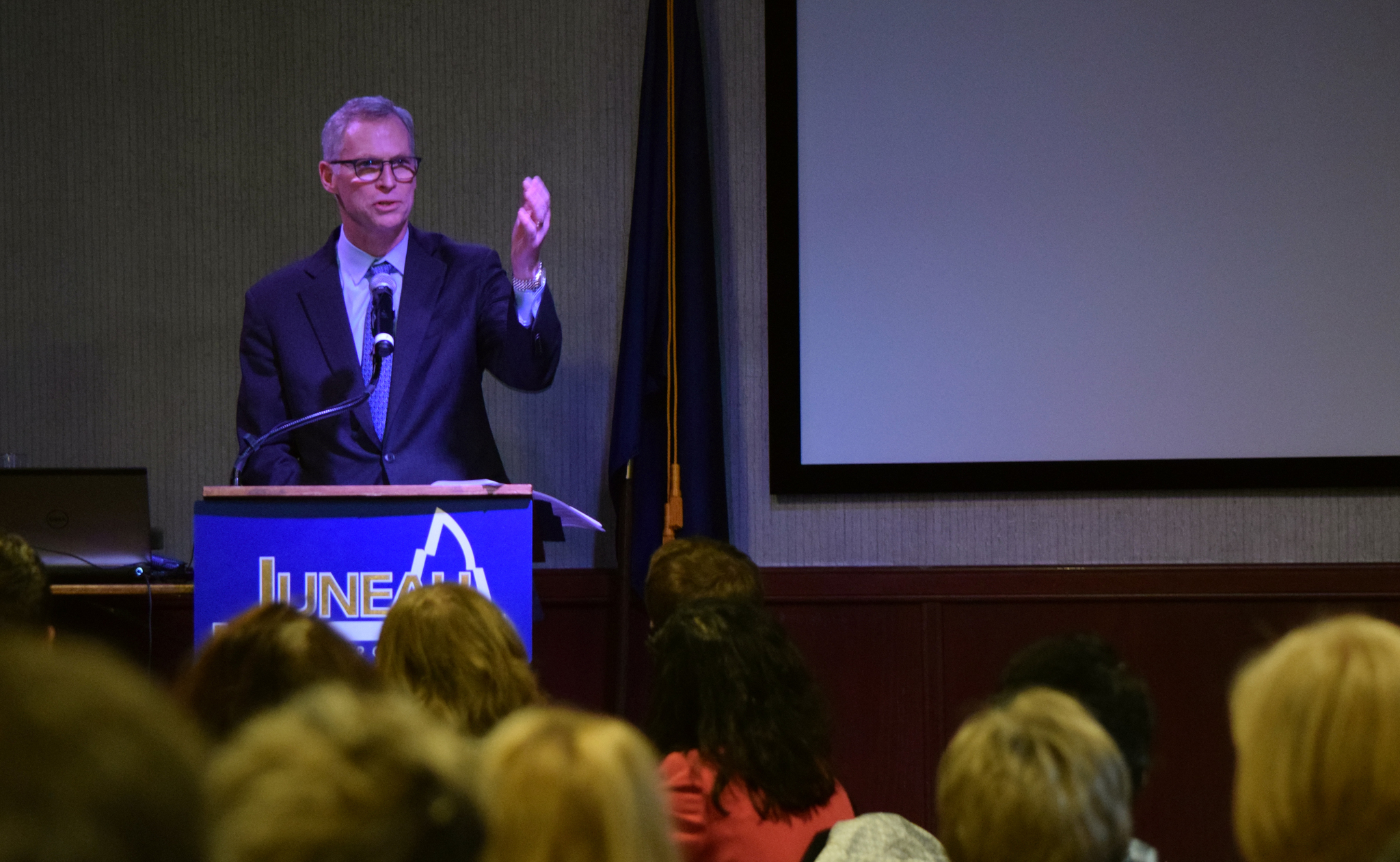University of Alaska President Jim Johnsen presented an upbeat, optimistic State of the University address to the Juneau Chamber of Commerce on Thursday, but a stern reception from the Alaska Senate Finance Committee indicates more cuts ahead for Alaska’s embattled university system.
“The state of the University of Alaska is strong,” Johnsen told the chamber, but later acknowledged, “our state and our university both face really serious challenges.”
Johnsen’s talk to the Chamber followed two hours of testimony in front of the Senate Finance Committee, which is hearing testimony from what it calls “the big four”: the departments of Education, Transportation, Health and Social Services and the university.
Gov. Bill Walker has proposed a mostly flat budget for Fiscal Year 2018 when compared to the current fiscal year, but majority members of the finance committee are looking for more cuts.
Johnsen pointed out that the University of Alaska system has already seen its budget reduced 14 percent since Fiscal Year 2014, when it received $377 million from the state’s general fund.
In the current fiscal year, UA will receive $325 million, and Walker proposed the same amount for Fiscal Year 2018.
Sen. Natasha von Imhof, R-Anchorage, is chairwoman of the subcommittee controlling the University of Alaska budget in the Senate. She and others on the finance committee said UA should prepare for a 5 percent reduction.
“It’s firm. That is the goal,” von Imhof said after Thursday morning’s meeting.
“The challenge at this point is after these 14 percent cuts we have already taken is what do we stop doing?” Johnsen asked the finance committee. “That’s what we’re struggling with at this point is what do we stop doing? Who do we stop serving?”
A 5 percent budget cut would cost the university $16.25 million but still leave it above average in terms of general fund support.
Johnsen said the university compares itself to the university systems of 15 other western states. In fiscal year 2016, the UA system received twice the average general fund support those states gave their university systems. Even with a 5 percent cut, UA would be about 1.2 times above average.
Speaking to the finance committee, and later to the Chamber, Johnsen said that figure doesn’t tell the whole picture. UA receives less support from industry than the university systems of other states do.
UA also didn’t receive an appropriate land grant at its inception, Johnsen said. As a land-grant university, UA was supposed to get a land base to support itself. The University of Washington, for example, owns a large amount of real estate in Seattle, and leases from that land pay for university operations.
“Only Delaware has a smaller land grant than the state of Alaska,” Johnsen told the Chamber.
In the finance committee, Johnsen was met by pushback from lawmakers who suggested that throwing money at the problem might not be the solution.
“How effective are the teachers?” asked Sen. Anna MacKinnon, R-Anchorage.
She referred to a chart presented by Johnsen. In it, Johnsen suggested that if the state selected 100 average Alaska ninth-graders, only 31 would go to college. Of those, only five would graduate from UA within six years of enrolling.
She called that rate “disappointing.”
“Perhaps it’s not a problem with funding, but with the effectiveness of the tool,” she said.
If the Senate approves a budget with a 5 percent cut to the university system, it will likely encounter pushback in the House, which has promoted new revenue as a way to balance Alaska’s $2.7 billion annual deficit.
Extensive debates will be needed to reconcile those views.
Regardless of the outcome, Johnsen told the senators that he is “confident we can continue as a great university, as a credit to this state.”
Speaking to the Chamber, Johnsen called back to the history of the university, which is observing its centennial year. He pointed out that the university has persevered before, and it will continue to do so.
“Times have been hard in the past, they’re hard now and they’ll be hard again,” he said.
• Contact reporter James Brooks at james.k.brooks@juneauempire.com or 419-7732.

